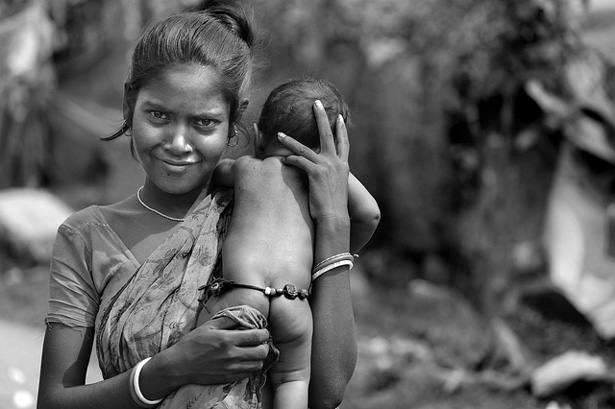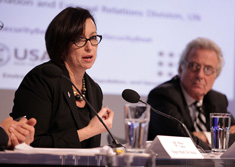-
Top 10 Posts for 2013
›
In what’s becoming a trend, another set of devastating natural disasters made headlines in 2013. Typhoon Haiyan enveloped the Philippines in November while the world watched online, and less publicized but just as traumatic, flash flooding in India this summer killed thousands of pilgrims making their way up Himalayan river valleys.
-
Facing the Challenge of Adolescent Pregnancy: ‘State of the World Population 2013’ Launch
›
Twenty thousand girls under the age of 18 give birth every day, and 90 percent of these births occur within the context of marriage, according to the UN Population Fund’s latest State of the World Population report. This year’s edition, launched at the Wilson Center on October 30, focuses on adolescent pregnancy and finding ways to better protect this vulnerable group of young women.
-
“Childhood Must Never Be Derailed by Motherhood”: Dianne Stewart on UNFPA’s ‘State of the World Population 2013’
›
Twenty thousand girls under the age of 18 give birth each day, according to the United Nations Population Fund (UNFPA). Two million girls age 14 or younger give birth each year. Societal norms often frame adolescent pregnancy as the result of promiscuous behavior, but this year’s State of the World Population Report encourages “a shift away from interventions targeted at the girl toward broad-based approaches that build girls’ human capital, protect girls’ rights, and empower them to make decisions,” says Dianne Stewart, director of the information and external relations division of UNFPA, in this week’s podcast.
-
Challenging Patriarchy: The Changing Definition of Women’s Empowerment
›
As more organizations in the international development community commit themselves to supporting women’s empowerment, it has grown increasingly difficult to evaluate what that really entails. [Video Below]
-
Food Security and Sociopolitical Stability (Book Launch)
›
Following a surge in global food prices in 2008 and again in 2011, policymakers and scholars have paid increased attention to the intersection of food security and political volatility. [Video Below]
-
David Canning: Africa’s High Fertility Can Change Quickly, Help Harness the Demographic Dividend
›
Compared to East Asia and Latin America, the “demographic transition” in Africa has been slower to date, prolonging periods of rapid growth and creating very youthful populations. But, explains David Canning in this week’s podcast, “the high level of fertility in Africa doesn’t seem to be something that is set in stone.”
-
Torrent of Water and Questions Pour From India’s Himalayas
›
We made the crossing at night from Chamoli, reaching Okund, a Himalayan foothill town after dark. The innkeeper, anxious for guests in a travel economy that came to a standstill in mid-June, cooked dal and nan bread for dinner and then showed us to a room that was unlit and unheated.
-
Critical Mass? How the Mobile Revolution Could Help End Gender-Based Violence
›
The past three years – and more pointedly the past 12 months – have laid witness to monumental, if not heartbreaking, incidents of gender-based violence. The gang rape of a 23-year-old woman in New Delhi last December; the gang rape of a 16-year-old girl left for dead in a pit latrine in Western Kenya last June; the mass sexual assault of women in Tahrir Square during the 2011 revolution in Egypt and since; all were high profile atrocities that ignited outrage around the world.
Showing posts from category *Blog Columns.











